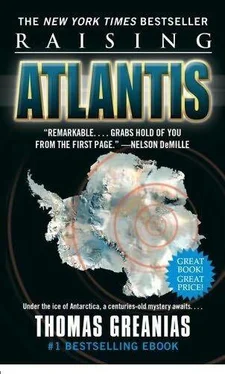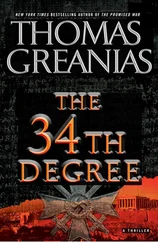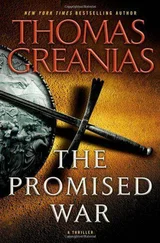“So where’s the rest of it?” he asked.
Yeats seemed to be holding back. “Rest of what?”
“The pyramid,” Conrad said. “This is a benben stone.”
“Benben?”
Now Yeats was just playing dumb, clearly eager to see if his investment in him was worth the cost. Conrad didn’t mind singing for his supper, but he wasn’t going to settle for crumbs.
“An ancient Egyptian symbol of the bennu bird-the phoenix,” Conrad said. “It represents rebirth and immortality. It’s the capstone or pyramidion placed on top of a pyramid.”
“So you’ve seen it before?”
“No,” Conrad said. “They’re missing from all the great pyramids of the world. We know them mostly through ancient texts. They were replicas of the long-lost original benben stone, which was said to have fallen from heaven.”
“Like a meteorite,” finished Yeats, staring at the rock.
Conrad nodded. “But a benben this size means the pyramid beneath it would have to be enormous.”
“A mile high and almost two miles wide.”
Conrad stared at Yeats. “That’s more than ten times the size of the Great Pyramid in Giza.”
“Eleven point one times exactly,” said Yeats. So his father had indeed done his homework. “Bigger than the Pentagon. And more advanced. Its exterior is smoother than a stealth bomber, which may explain why it’s been invisible to radio-echo surveys. These grooves on this capstone are P4’s only distinguishing exterior characteristic. Beyond its sheer size, of course.”
Conrad touched the benben stone again, still incredulous that civilization existed on Earth at an earlier date and at a more advanced level than even he previously imagined.
“P4,” Conrad repeated. So that’s what they were calling it. Shorthand for the Pyramid of the Four Rings. It made sense. “And it’s at least twelve thousand years old.”
Yeats said, “If it’s as old as this benben stone, then P4 is at least six billion years old, son.”
“Six billion?” Conrad repeated. “That’s impossible. Earth is only four and a half billion years old. You’re telling me that P4 could be older than the planet?”
“That’s correct,” Yeats said. “And it’s right under our feet.”
Discovery Plus Twenty-Four Days, Fifteen Hours
Yeats could hear the faint strains of Mozart beneath the drone of two ventilation fans pumping air inside his compartment as he watched Conrad analyze the data from P4 on his laptop.
Cupping a mug of hot coffee in his bandaged hand, Conrad shook his head. “Nothing ever changes with you, Dad, does it?”
Yeats stiffened. “Meaning?”
“You never taught me how to fly a kite or how to throw a split-fingered fastball when I was growing up,” Conrad said. “No, I had to learn that kind of stuff on my own. With you it was always, ‘What do you think of this weapons system design, son?’ or ‘How’d you like to watch the launch of my new spy satellite?’ And whenever I see you on this stinking planet, the scenery is always the same. It’s always some military base. Always dark. Always cold. Always snowing.”
Yeats glanced out the picture window at the storm raging outside. The whiteout was so bad he couldn’t even see the ice gorge anymore. What was left of the C-141 was long buried by now. He was relieved Conrad had survived the crash, and he was happy to see him. But it was clear Conrad didn’t feel the same way, and that hurt.
“Maybe I bring it with me.” Yeats poured himself a third shot of whiskey and nodded to the laptop data. “Anyway, the carbon dating appears conclusive.”
“For the benben stone only,” Conrad began as another wave of those train like shudders passed through the room.
“That was ours,” Yeats said, referring to the drilling being done to clear the ice around the top of P4 at the bottom of the abyss. “You’ll know the real jolt when you feel it.”
“And you think P4 is causing the earthquakes?”
“You’re the genius, son. You tell me.”
Conrad sipped his coffee and grimaced. “What the hell is this? Diesel sludge?”
“It’s the water. The station’s supply comes from melted snow. The soy-based food is even worse.”
Conrad pushed the coffee away. “Just because P4’s benben stone is allegedly six billion years old doesn’t mean the rest of the pyramid is that old or that aliens built it.”
“Who said anything about aliens?” Yeats tried to maintain a blank expression, but Conrad was way ahead of him.
“Meteorites have been bombarding the earth since the planet was first formed-like that four-and-a-half-billion-year-old Martian rock they found here in Antarctica a few years back,” Conrad said. “Humans could have found a meteorite billions of years later and carved it into a benben stone.”
Yeats downed his Jack Daniel’s. “If that makes you feel better.”
“Well,somebody built P4,” Conrad said. “And they built it long before ice covered Antarctica or any human civilization was thought to exist. Whatever else the builders of P4 were, they were advanced, possibly more advanced than present-day human civilization.”
Yeats nodded. “Which means whoever gains access to their technology theoretically could alter the world’s balance of power.”
“Still paranoid about asymmetrical force?” Conrad said. “No wonder you’re willing to risk lives and break international law by fielding a military presence in Antarctica.”
Yeats paused. “You mean Atlantis.”
“Atlantis? You think there’s a city down there?”
Yeats nodded. “For all we know P4 is only the tip of the iceberg, so to speak.”
“Atlantis is just a name, a myth,” Conrad said. “Maybe that myth is based on what you think you’ve found. Maybe not. Maybe it’s our long-lost Mother Culture. Maybe not. A proper excavation of P4 alone would require decades of research.”
That was just like Conrad, Yeats thought. It wasn’t enough to find the greatest discovery since the New World. No, Conrad had to be “right” about it, lest he be another Columbus who had discovered what had always been there.
“We don’t have decades, son,” Yeats explained. “We have days. Now I saw one of your TV specials and you said flat out that Antarctica was Atlantis.”
Yeats clicked on his computer and an Ancient Riddles promo popped up. Yeats glanced at Conrad, who grimaced in embarrassment.
“Atlantis,” boomed the baritone announcer. “The ancient city of fantastic wealth and military power described by the ancient Greek philosopher Plato in his Dialogues in the fourth century B.C. An entire civilization swallowed up by the sea in a single day. Its survivors sought refuge all over the world and built the pyramids of Egypt, the ziggurats of South America, and other ruins of unexplained origins. Come explore the unexplained with astro-archaeologist Doctor Conrad Yeats.”
Yeats turned it off. “Well?”
“What I said is that Antarctica is the only place on Earth that literally fits Plato’s description of Atlantis,” Conrad explained. “I never said I actually believed Plato’s account was true. Remember, it’s a publish-or-perish world in academia, Dad, and only the wildest ideas garner attention.”
Yeats frowned. “You’re saying Plato is a liar?”
Conrad shrugged. “Plato was simply an idealist who dreamed up a perfect paradise, Atlantis, to express his yearnings.”
Yeats was disappointed in Conrad’s flippant response and narrowed his eyes. “Whereas you have no ideals.”
“Every archaeologist has his favorite address for Atlantis,” Conrad said. “Most think it’s the island of Thira in the Mediterranean, which sank into the sea after its volcano exploded. That was nine hundred years before Plato penned his account of Atlantis. Others favor the North Atlantic or Troy in Turkey, a city which itself was considered a myth until its ruins were recently discovered. Still others suggest that Atlantis was really the Americas and that the lost city could well lie beneath Lake Titicaca, or Los Angeles for that matter.”
Читать дальше












